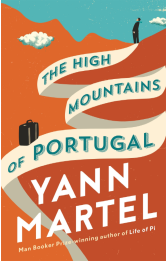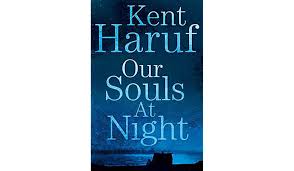Yann Martel, “The High Mountains of Portugal” and Kent Haruf, “Our Souls at Night”
 Love is a house with many rooms, this room to feed the love, this one to entertain it, this one to clean it, this one to dress it, this one to allow it to rest, and each of these rooms can also just as well be the room for laughing or the room for listening or the room for telling one’s secrets or the room for sulking or the room for apologizing or the room for intimate togetherness, and, of course, there are rooms for the new members of the household. Love is a house in which plumbing brings bubbly new emotions every morning, and sewers flush out disputes, and bright windows open up to admit the fresh air of renewed goodwill. Love is a house with an unshakable foundation and an indestructible roof. ( p23-24, The High Mountains of Portugal)
Love is a house with many rooms, this room to feed the love, this one to entertain it, this one to clean it, this one to dress it, this one to allow it to rest, and each of these rooms can also just as well be the room for laughing or the room for listening or the room for telling one’s secrets or the room for sulking or the room for apologizing or the room for intimate togetherness, and, of course, there are rooms for the new members of the household. Love is a house in which plumbing brings bubbly new emotions every morning, and sewers flush out disputes, and bright windows open up to admit the fresh air of renewed goodwill. Love is a house with an unshakable foundation and an indestructible roof. ( p23-24, The High Mountains of Portugal)
Three widowers, Tomas ( 1904), Eusebio Lozora (1938) and Peter Tovy ( 1981), are the protagonists in three loosely interlinked stories — “Homeless”, “Homeward” and “Home”. These are in Yann Martel’s latest offering, The High Mountains of Portugal. There is a sense of loneliness and despair. The three long stories are the ways in which the men come to terms with losing their beloved. With Tomas it is walking backwards and then going off to the High Mountains of Portugal in search of a church relic. For Eusebio solace is to be found somewhere in the space of living and the dead, usually during the many hours he spends conducting autopsies in his office. And for Canadian Senator Peter Tovy it is buying a chimpanzee from a laboratory, Odo, and creating a life for themselves together in Portugal, Peter’s country of origin. The three stories are connected unexpectedly but these links do not strike as jarring a note as one would expect. Funnily enough these magic realist tales are incredibly soothing to read, particularly “Home”. It is inevitable comparisons will be made between Karen Joy Fowler’s Booker-shortlisted We Are All Completely Beside Ourselves as was done by Ursula Le Guin in her book review. ( The Guardian, 27 January 2016 http://www.theguardian.com/books/2016/jan/27/the-high-mountains-of-portugal-yann-martel-review ) Yet the detail and incredible amounts of research it must have required to write this story are masked completely by the sensitive and movingly told relationship between Peter and Odo. But then the idea of a journey, self-growth of the narrator and with a wild animal as a companion is not a unique idea for Yann Martel.
Yann Martel was incredibly lucky when his second book, Life of Pi. It sold over 4 million units and continues to be in print. ( The success of this novel is indicated by placing it as a qualifier beneath Yann Martel’s name on the new book cover as “Author of Life of Pi“.) It is a an enviable luck. But what is even more striking is how the luxury of money allows the writer the time and artistic license to play with ways of storytelling. With a seemingly traditional and old-fashioned opening in “Homeless” Yann Martel moves on surely and steadily to tickle the imagination and challenge the reader to engage with the text such as the image of the ape, Peter and his son trying to read Agatha Christie’s Appointment with Death in Portugese, together. It is an extraordinary experience and not to be easily forgotten.
Juxtapose this with the late Kent Haruf’s heartbreakingly tender tale Our Souls at Night. It is about two elderly people — Addie and Louis. Both single having lost their spouses a little while earlier. Both have children who have left the small town they live in for better pastures in the big cities. It is about their unique friendship. Of spending time together at night chatting quietly, lying side by side in bed, neatly sidestepping traditional roles and expectations. This gives them much solace since they are past the age of caring what others think. Yet it sets tongues wagging amongst the locals and upsetting their children considerably too who return to check upon the parents. Both, Addie and Louis, have reasons to grieve but have worked out that they derive immense happiness in this unexpected way of life. Even for the short duration that they are responsible for the caregiving of Addie’s six-year-old grandson they come across as a contented family unit.
Souls at Night. It is about two elderly people — Addie and Louis. Both single having lost their spouses a little while earlier. Both have children who have left the small town they live in for better pastures in the big cities. It is about their unique friendship. Of spending time together at night chatting quietly, lying side by side in bed, neatly sidestepping traditional roles and expectations. This gives them much solace since they are past the age of caring what others think. Yet it sets tongues wagging amongst the locals and upsetting their children considerably too who return to check upon the parents. Both, Addie and Louis, have reasons to grieve but have worked out that they derive immense happiness in this unexpected way of life. Even for the short duration that they are responsible for the caregiving of Addie’s six-year-old grandson they come across as a contented family unit.
Our Souls at Night & The High Mountains of Portugal are stories that gently but magnificently delve into that very moment immediately after the death of a spouse — loved or not is not necessarily always the question. But the sheer loss of losing someone with whom you have co-habited and existed for decades leaves a devastating hole in one’s life that is not always easily comprehended by family. These two books that despite being heartbreakingly tender are surprisingly very comforting to read. It is worth spending time with them. I hope many copies are sold. Question begs to be asked. Do readers have the space to read mature stories especially that are at a lower pace and dwell on old age? Nowadays there is so much of the angry new novel and baring one’s heart and soul, where do these beautiful novels find their readership?
( Two other novels I would put in the same category as these novels are Isabel Allende’s The Japanese Lover and Toni Morrison’s God Help the Child. )
Yann Martel The High Mountains of Portugal Canongate, London, 2016. Pb. pp. 332. Rs.599
Kent Haruf Our Souls at Night Picador, London, 2015. Hb. pp. 180. Rs 550
24 March 2016
